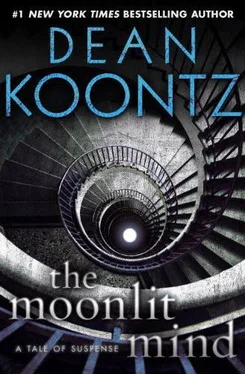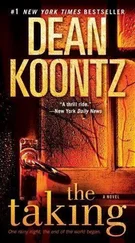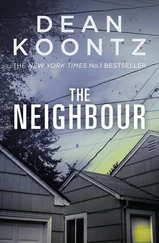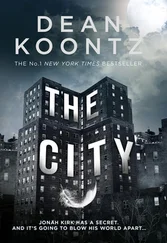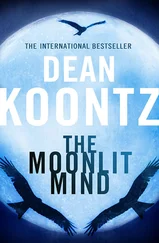Upon entering the room, when he switched on the overhead lights, all the lights in the model came on as well: intricate nine-inch-diameter crystal chandeliers that are three feet across in the real house, three-inch-high sconces, blown-glass lamps as short as two inches and stained-glass replicas as tall as six.
For a moment, everything in the thirty-five-foot hallway — which, end to end, is 140 feet in the real house — looks exactly as it always has, and as it should. Then movement startles Crispin. Approaching along this corridor is something low and quick.
Two somethings.
A pair of white cats.
Each cat might be a foot long in real life, but three inches here. They are too lithe, too fluid to be mere mechanical creations. On a flurry of paws, they ripple toward him, but abruptly they cross the hall and disappear through the open doors of the drawing room.
Electrified, fully awake as he has not been in weeks, Crispin quickly circles to the west face of the miniature mansion, finds the drawing room, and discovers two snowy cats, no bigger than mice, on the window seat, peering out at him through the tiny panes of the French windows.
December 3, the last night of Crispin’s thirteenth year, his fourteenth ahead of him if he can survive it …
Boy, girl, and dog take the elevator down from the fourth to the second floor where, among other temptations to the wallet, waits the toy department.
Unable to be price-competitive with discounters like Toys R Us, Broderick’s stocks exotic and expensive items not found elsewhere but still moves the more ordinary items at Christmas by making of the toy department a wonderland of highly decorated trees, animated figures, snow scenes, and ten thousand twinkling lights. The space given to this department triples with the season, and many people in the city consider it a tradition to visit the display after their children have moved away from home and even if they don’t have grandchildren to spoil.
Even seen by flashlight, with the leaping reindeer stilled and the capering elves frozen in place in the fake snow, this world of toys is nevertheless impressive. This year, the marvel at the center of the department, the thing that Amity has brought him here to see, is a scale model of the department store.
Broderick’s has commissioned nothing so ambitious as a quarter-scale rendition. Instead, it is forty-eighth-scale, one quarter of an inch to one foot in the real structure. Nevertheless, the model proves to be sufficiently immense to delight children and adults as well. Crispin is a child, Amity an adolescent, both of them adults by virtue of their suffering, and they are charmed. Even Harley rises up with his forepaws on the support table and pants with apparent admiration. The detailing is not as impressive as the obsessive workmanship in the miniature room at Theron Hall, though it is so well done that it’s magical in its own right.
This approximately eight-foot-square reduction of Broderick’s is not the sum of the display. Instead of a glass globe, it stands within a thick Plexiglas case that is filled with a mixture of water and something else, Amity knows not what. She does know where to find the switch that operates it, however, and when the tank lights, it also fills with falling snow that settles slowly through the fluid before being recycled to the top by a pump.
As the night now casts snow down upon the true Broderick’s, so snow falls upon the model, and the real and the fantastical are one. They are always one, of course, but seldom so obviously as here and now, when the modelmakers’ creation and the Creation of which the modelmakers are themselves a part are synchronized to suggest, inescapably and powerfully, that the world is potentially a place of harmony if only harmony is wanted and sought.
They stand in silence awhile, and then Amity says, “Seems to be a sign, don’t you think?”
Crispin doesn’t reply.
“The store has never done this before.”
He keeps his silence.
“The three cats you saw in that other miniature may still be there.”
“Two cats. It was my brother who said he saw three, but in the real house, not in the model. Anyway, they fled from the window seat as I looked in at them. I never saw those cats again.”
“That was your last day in Theron Hall. You never had a chance to see them again.”
“I didn’t understand what they were. I probably never will.”
“They’re unfinished business,” Amity says.
Snow falls and snow falls.
“The store has never done this before,” she reminds him.
Broderick’s stands here within Broderick’s, and both turn with the turning world.
“We’ll have a birthday dinner tomorrow,” Amity says. “And then we’ll consult your cards.”
“I don’t know.”
“You do know. You could have left this city long ago, gone far, someplace they’d never look for you.”
“I think their kind is everywhere. No place to hide.”
“Whether that’s true or not, you’ve stayed in this city because something calls you back to that house.”
“Something that wants me dead.”
“Maybe so. But something else, too.”
“What would that be?” he wonders.
“I don’t know. But you do. Deep down, you know. Your heart knows what your mind can’t quite comprehend.”
Snow falls and snow falls.
Nine-year-old Crispin on the afternoon of September 29, the feast of the archangels …
Two minikin cats on a tiny window seat in small-scale Theron Hall react as one, bolting away from the giant boy who peers in at them. They scamper through the modeled drawing room, into the hallway, gone.
He might have hurried window to window in search of them, but before he can do so, he remembers what happened on the night when Mirabell disappeared. The sight of the cats is a purgative, flushing from him all delusion, all spells and enchantments. Everything he has forgotten — or has been made to forget — returns to him in a flood of memories.
How he pretended to sleep when Nanny Sayo stood by his bed. How he sneaked into Mirabell’s room. The rose petals in the bathtub, the silver bowls, the missing toys, the empty closet. His sister’s plea blooming like a shellburst in his mind: Crispin, help me! His parents’ bedroom so ornate that its richness and lush textures suffocated him. Crispin, help me!
Now his legs grow weak. He drops to his knees beside the scale model of Theron Hall.
He recalls also hurrying through the mysteriously deserted house, the servants neither working nor in their rooms, no one to help him. The south stairs winding down to the locked basement door. The voices beyond. Chanting.
In memory, he turns to climb the stairs. Towering over him is Cook Merripen in a black silk robe. Holding a thermos from which he has unscrewed the lid. This might be the same thermos in which Nanny Sayo left chicken noodle soup for the boy when he was ill. The cook slams Crispin back against the locked door. The boy cries out, the thermos tips, and a torrent of something warm and vile gushes out of the insulated bottle and into his mouth. It tastes like chicken soup but rancid, the noodles slimy. Crispin chokes on it, tries to spew it back, but is forced to swallow. As his vision clouds and darkness spills through his mind, the last thing he sees is the hate-distorted face of Merripen as the cook says, “Piglet.”
Having collapsed entirely on the floor of the miniature room, further weakened by the very recognition of his weakness in recent days, shamed by his gullibility, torn by guilt over his failure to help his sister, he weeps for a while … until his weeping begins to sound pitiable. Soon it is worse than pitiable — like the wretched complaint of a wounded and helpless animal.
Читать дальше
Конец ознакомительного отрывка
Купить книгу
